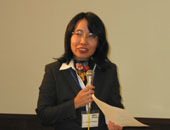
Chiharu Takenaka, Meiji Gakuin University

Good morning. Thank you very much for joining our workshop on historiography. More accurately, the workshop titled gWhat is to be Written? Setting the Agendas for Studies of Historyh is funded by our university, Meiji Gakuin University, and the Ministry of Education, Science and Technology of Japan. This is the second workshop, which succeeded last yearfs workshop. This year, the Nomura Foundation also assisted our project. Needless, this is a technical thing I should say.
Also I would like to say one thing about the concept of this workshop today and tomorrow. This is not a formal conference, or a formal symposium, to a very big audience. Rather, it is a small, cozy, casual workshop. But because it is a workshop, we should produce something. It should be very productive for ourselves and for others.
As I am the main organizer, I thought we could produce many things such as sharing knowledge and information about other areas and othersf specialties, or getting new perspectives or new problematics for historical studies. And also yesterday we discussed a book, which we are going to definitely publish for sharing our product from the workshop with other people in various places, various countries of the world, to send messages from our workshop. I think, finally and most importantly, it is to produce or to make friendships between scholars who share common interests in our own studies and to have a free and very warm atmosphere and discussion. That is the purpose of this workshop and I hope we can be very productive today and tomorrow.
Before I conclude this remark, I would like to add two points. One is a minor thing but maybe I should say this. In the program, some presentersf titles are a little different from the final papersf titles, so I am sorry for this confusion. Because of the very tight schedule this week we could not change the titles of some of them, including mine.
And second, I would like to say that my university, the Institute for International Studiesf staff really worked very hard for this workshop and I would like to introduce their names. Our chief assistant is Ms. Kagohashi. The main coordinator for this Academic Frontier is Ms. Imamura. The designer and artist and also assistant is Ms. Ogawa, who drew this beautiful flowery cover. This indicates the bright future of the 21st century, not a gloomy one, so we should work on that. Ms. Murata is also our assistant and she worked very hard. Ms. Matsushita newly joined our efforts and Mr. Kimura is a graduate student of ecology and also he is a superb computer expert. For example, these are the proceedings of last year and this is the product of this yearfs team, and I am very proud of it.
The Meiji Gakuin staff have this one hanging, so please ask us whenever you have questions or need help. Okay, so before I conclude I have to say that to have a very substantial discussion I did not follow all the formalities, so nobody knows the top people of the university are not here such as the Chancellor or Dean, but the Director, Dr. Kei Takeuchi, who is the founding father of this workshop and academic frontier project, will be joining us later this afternoon.
So then, I think I will conclude my opening remarks. Thank you very much.